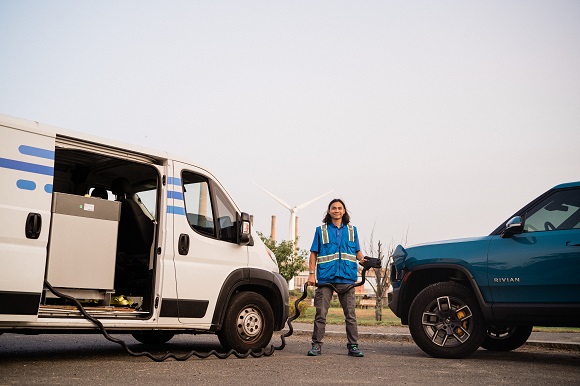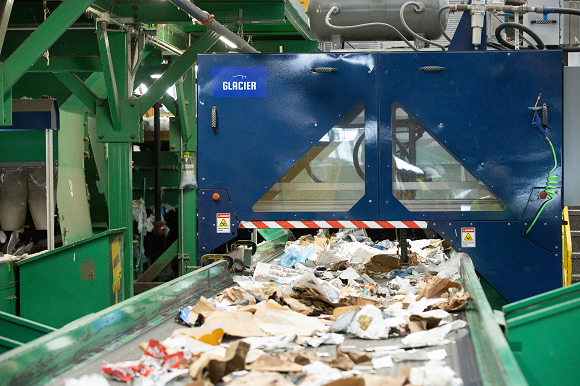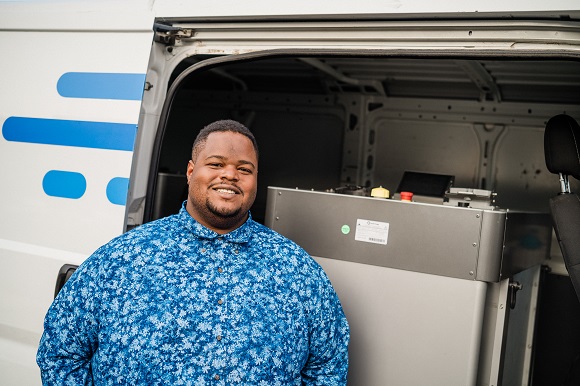
SparkCharge, a mobile electric vehicle charging network designed to make EVs more practical for the general public. SparkCharge Project Manager Gamal Sofiadi with SparkCharge mobile electric vehicle charging. — Photo by Elemental Excelerator / Chris McIntosh
Nonprofit investor continues focus on centering communities through investments in traditionally excluded founders and deep commitment to workforce development
Elemental Excelerator, a leading nonprofit investor in climate technology for deep community impact, introduced its latest cohort, bringing its total amount of investments to $79M. With this latest cohort, Elemental is infusing another $12.5M into climate solutions and will spearhead the development of 15 transformative technologies crucial for heating and cooling our homes, reimagining critical resource extraction, advancing carbon removal and transforming our food system. These 15 climate companies will join an existing portfolio of more than 150 investments.
Elemental is expanding its support for visionary entrepreneurs who are addressing climate challenges in innovative ways. This group of investments is led by 60% of the CEOs identifying as traditionally excluded by race or ethnicity and 33% are led by CEOs who identify as traditionally excluded by gender. Of the $12.5M invested in Cohort 12, $7.2M is allocated to companies with traditionally excluded CEOs either by gender or race/ethnicity.
Elemental’s 12th cohort focuses on a range of societal challenges, including sustainable urbanization, building decarbonization, electric vehicle charging, last-mile logistics, recycling optimization and regenerative food production. This cohort also represents Elemental’s largest investment in its Project Track, which deploys innovative technology in unprecedented ways – such as a first in a new geography, first deployment at scale, first project utilizing a new business model or first project in a low-income or disadvantaged community.
In addition to prioritizing community impact in its selection process, Elemental designs community engagement into the plan of every project deployment, and offers coaching on community engagement and workforce development. A significant portion of the cohort has a dedicated commitment to workforce development, many leaning into hiring and training locally, working with underrepresented groups and community members and upskilling and transitioning workers from the oil and gas industry.
“This year, record heat and climate-fueled disasters have devastated our communities. Investors and innovators are taking note, and are pouring in to address climate change. This year, we met some of the strongest entrepreneurs in our 13+ years investing, and I am thrilled with the boldness and ambition of the companies in this cohort,” Elemental Founder & CEO Dawn Lippert said. “These are the innovators who are creating the huge companies of the future – ones that invest in workers, reduce pollution, restore our soils and lower the costs of food and energy.”
With the inclusion of the 15 new investments, Elemental’s portfolio has expanded to encompass more than 165 companies, establishing a global presence that spans all 50 states and reaches more than 100 countries.
The Cures for Carbon: Elemental is committed to advancing emerging technologies in deep decarbonization that leverages Earth’s natural resources of air, oceans and soil to achieve necessary carbon removal levels by 2030 and beyond while fostering resilience and sustainability for communities on the frontlines.

Capture6 Technology: ocean water. — Photo By Elemental Excelerator / Laura Morton
-
Capture6 removes carbon from the atmosphere using direct-air capture technology while increasing freshwater production by recovering more than 70% of clean water from brine.
-
The why: The nearly 16,000 desalination plants around the world create enough waste to cover Florida with a foot of brine each year.
-
-
Ebb Carbon enhances the ocean’s ability to absorb CO2 in a safe and natural form, delivering one of the most scalable and cost-effective carbon removal solutions on the market while benefiting coastal communities.
-
The why: By far the world’s biggest carbon sink, the ocean absorbs more than 30% of CO2 emissions in the atmosphere.
-
-
Yard Stick PBC‘s probe instantly and accurately measures soil carbon to unlock the full environmental and economic potential of regenerative farming, ranching and forestry practices.
-
The why: Soil carbon sequestration could remove 3.5 gigatons of CO2 annually by 2030.
-

Glacier technology at Recycle Central. — Photo credit: Elemental Excelerator / Laura Morton
Reimagining Our Resources: Everything we eat, drink and build comes down to our raw ingredients and materials, typically sourced using methods that bring ecological destruction and harm to frontline communities. We are supporting solutions that redefine the sourcing of foundational elements in ways that not only avoid harm but have the potential to actively bring benefits to communities.
-
C16 Biosciences developed a biotechnology platform to create truly sustainable oils and fats, starting with a replacement for palm oil, which is found in 50% of consumer products and is a major culprit of deforestation.
-
The why: Palm oil is responsible for 1.4% of total GHG emissions, about as much as the entire aviation sector.
-
-
Edacious bridges the gap between agriculture and human health by enabling the food system to accurately measure, report and verify the nutritional content of whole foods.
-
The why: Agricultural practices that maximize crop yields over soil health have given us fruits and vegetables with 38% less nutrients than those grown in 1950.
-
-
Genomines uses genetically enhanced plants to pull critical minerals like nickel from lands with metal concentrations too low for conventional mining processes, but too high for agricultural use.
-
The why: Hitting the world’s net-zero goals will require 6x today’s global output for critical minerals, and current mining practices are environmentally toxic and wildly inefficient.
-
-
Glacier‘s low-cost, easy-to-install sorting robots make it possible to keep more recycling facilities running sustainably in more communities, and provide item-level visibility on exactly which materials are being recycled.
-
The why: Curbside recycling is not accessible for nearly half of Americans (41%), and only recovers a third of available recyclables.
-
-
Maui Nui Venison simultaneously alleviates the damaging impact invasive deer have on Hawaiʻi’s beautiful and vulnerable ecosystems while unlocking a delicious, healthy, local food resource.
-
The why: Left unchecked, Maui’s axis deer population could swell from 60,000 to 150,000 within five years, decimating local farmlands and watersheds.
-
-
Olokun Minerals extracts multiple minerals like lithium, magnesium and sodium from unconventional water resources, helping build the domestic supply chain needed for batteries and other vital clean energy technologies.
-
The why: With demand for lithium growing twice as fast as production, the U.S. produces less than 2% of the global total.
-

SparkCharge, the Somerville-based company led by Joshua Aviv, a 30-year-old Black entrepreneur who has been featured on “Shark Tank.” — Photo by Elemental Excelerator / Chris McIntosh
The Future at Your Fingertips: Cities are responsible for 75% of worldwide carbon emissions, with transportation and buildings as major culprits. Yet, urban households have a 50% lower carbon footprint than suburban or rural counterparts. We are deepening our investments in sustainable urban solutions, focusing on building decarbonization, electric vehicle (EV) charging in cities, and enhanced delivery and logistics networks.
-
Bedrock Energy decarbonizes buildings like office towers or apartment complexes with large-scale geothermal systems that are smaller and faster to install.
-
The why: Geothermal offers the best pathway to decarbonize HVACs for large commercial buildings without adding stress to the grid.
-
-
Gradient‘s window heat pumps offer a hassle-free solution for year-round heating and cooling, with cold-climate capability for winter, climate-friendly refrigerants for summers and smart grid optimization for energy efficiency.
-
The why: It’s expected ACs will triple the energy demand by 2050, making it a primary driver of global electricity consumption (it’s already responsible for nearly 4% of global greenhouse gas emissions).
-
-
HIVED is modernizing package delivery with 100% electric vehicles, equitable pay for drivers and a friendly user experience for both retailers and people awaiting their purchases.
-
The why: The number of delivery vehicles on the road by 2030 is projected to swell by 36%, potentially adding millions of tons of CO2 emissions.
-
-
Kelvin transforms the energy inefficiency of radiator-heated buildings by integrating smart, insulated radiator covers with heat pumps and thermal batteries, achieving 80% electrification of heating at just 10% of the conventional cost.
-
The why: Boilers, with a 15-20 year lifespan, traditionally lock buildings into extended periods without electrification options.
-
-
SparkCharge‘s mobile charging solutions allow EV drivers to get miles of range delivered anywhere, helping the company become the fastest growing charging network in the U.S.
-
The why: The number of EVs in the U.S. is growing faster than the infrastructure to support them, with about 18 EVs for each public charging point.
-
-
SunFi simplifies clean energy adoption in Nigeria by connecting consumers with trusted solar installers and providing flexible financing to keep costs low.
-
The why: Despite the continent’s vast potential for solar power, Africa sees only 3% of global investment in clean energy infrastructure.
-
Elemental will provide its extensive wraparound services to these new investments as it does to all its portfolio companies, from carbon finance, to sales, to social equity to policy coaching and beyond. Elemental has over a dozen expert coaches on roster in addition to its team of professionals across data, communications, development and more.
About Elemental Excelerator
Elemental is a nonprofit investor in climate technologies with deep community impact. We bring more than a decade of experience across the climate sector, with an active and maturing portfolio of 150+ companies. Elemental fills two gaps fundamental to addressing climate change: funding projects for climate technologies in communities, and embedding equity and access into climate solutions. We invest in transformative technologies to create a systems change for a more resilient, equitable future.















Reader Comments